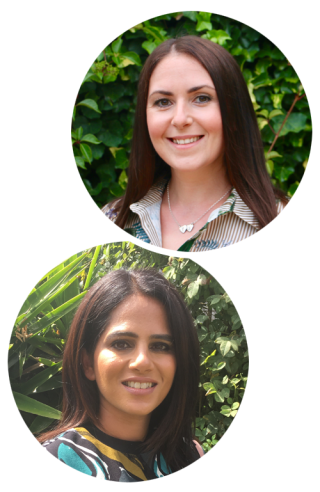Meet the Team
All of our Educational Psychologists are highly experienced practitioners who have extensive experience working in Local Authorities. They all have the required professional qualifications in Educational, Child and Adolescent Psychology; are registered with the Health and Care Professions Council (HCPC); and have Chartered Psychologist status with the British Psychological Society (BPS).


Co-Founders and Directors
Dr. Laura Grahamslaw: BSc, DAppEdPsy, CPsychol, AFBPsS
Laura founded Psychology First with Dr Chantelle Makin in 2018 and has over sixteen years of experience working with Local Authorities. She completed her Doctorate in Applied Educational Psychology at Newcastle University, and for her thesis she evaluated the impact of the Emotional Literacy Support Assistant (ELSA) Project on support assistants’ and children’s self-efficacy beliefs. Following her thesis research, and due to her interest in emotional literacy and self-efficacy, Laura and a colleague set up the ELSA project in Surrey in 2011, and a significant number of ELSAs have been trained across the county to date. Since then, Laura has been instrumental in the design and implementation of the ELSA training and supervision, and in 2019 she introduced and set up the Early Years (EY) ELSA training in Surrey. Laura and Chantelle are currently evaluating the impact of the EY ELSA training and supervision on EY practitioners and their settings.
Due to her longstanding involvement with and passion for the ELSA Project, Laura is a member of the ELSA Network Steering Group. The role of the steering group is to manage the ELSA Network; provide accountability; support good practice in training and supervision; and help to ensure the continued development and sustainability of the ELSA model.
Prior to founding Psychology First, Laura was an Academic and Professional Tutor on both the Doctorate in Educational and Child Psychology at University College London (UCL) and the Doctorate in Professional Educational, Child and Adolescent Psychology at the Institute of Education (IOE). She is passionate about the supervision of Educational Psychologists, is highly experienced in this area and has completed further training in psychological supervision at the Tavistock and Portman NHS Foundation Trust.
In addition to her work as an Educational and Child Psychologist, Laura is an equine facilitated psychotherapist. Through her company ‘Stable Minds’ and alongside her herd, she offers in person equine facilitated psychotherapy using an integrative, psychodynamic, and narrative approach, to children, young people, and adults.
She is also a trained Paediatric Sleep Consultant and has completed the Paediatric Sleep Disorders OCN Level 6 qualification. She provides sleep support to families and schools through ‘Sleep First’, a Sleep Consultancy and Education Service.
Laura has undertaken additional training in a range of psychological models and interventions including: Narrative Therapy Levels 1 and 2; Theraplay; Dynamic Assessment; Motivational Interviewing; Mindfulness; supporting pupils who self-harm; Optima Reading Programme and the Principles of Instructional Psychology; Personal Construct Psychology; Sycol Solution Oriented Schools; Video Interaction Guidance (VIG); Circle of Adults and PATH; Emotion Coaching; Anxiety; Relational and Developmental Trauma; and Suicide Bereavement, Prevention and PostVention. Laura is also a qualified Mental Health First Aider.
Laura lives in Surrey with her husband and two daughters.
Publications and research:
Dr. Chantelle Makin: BSc, PGCE, DEdPsy, CPsychol
Chantelle completed her Doctorate in Professional Educational, Child and Adolescent Psychology at the Institute of Education, University of London, in 2011, having previously worked as a primary school teacher. She has worked in education for over twenty years and has gained extensive experience working with children, young people and adults with Special Educational Needs, and their families and school staff, across a range of educational settings.
Chantelle has been involved in LA wide projects linked to her interests in autism and emotional literacy. Chantelle was a Lead Trainer central to the first-time implementation and roll-out across an LA of the Cygnet Parenting Programme, an education and support programme for parents and teachers of children, young people and adults with autism. Chantelle has a particular interest in autism and for her doctoral research study she engaged with children with autism and their parents and teachers living across an LA to understand their experiences in relation to the secondary transition process. Over the years, Chantelle has been extensively involved in the design and implementation of the Emotional Literacy Support Assistant (ELSA) project and in 2019, along with Laura, she brought the Early Years (EY) ELSA training to Surrey for the very first time.
Chantelle is trained in clinical supervision and has worked as an Academic and Professional Tutor on the Doctorate in Professional Educational, Child and Adolescent Psychology at the Institute of Education supervising Trainee Educational Psychologists (TEPs), a role which allowed her to further her experience in Video Enhanced Reflective Practice (VERP). Chantelle enjoys using her extensive supervision experience in her work in schools, including supervision for teachers, support staff and ELSAs.
In addition to her work as an Educational and Child Psychologist, Chantelle is also a trained Paediatric Sleep Consultant and she has completed the Paediatric Sleep Disorders OCN Level 6 qualification. Chantelle provides sleep support to families and schools through ‘Sleep First’, a Sleep Consultancy and Education Service.
Chantelle has taken part in advanced practitioner training in a number of psychological topics, frameworks and interventions including: The Principles of Instructional Psychology, Organisational Change – Solution Oriented Schools, Circle of Adults and PATH, Mindfulness, Dynamic Assessment, Narrative Therapy Level 1, Adolescence, Anxiety and School Refusal, Emotionally Based School Avoidance, Pathological Demand Avoidance (PDA), Autism and Anxiety, Video Interaction Guidance (VIG), Emotion Coaching, Suicide Prevention, Supporting Trans and Non-Binary Children and Young People and Developmental and Relational Trauma and Adverse Childhood Experiences (ACES) and attachment. Chantelle has also completed further training in supervision at The Tavistock and Portman NHS Foundation Trust, as well as further training in EP consultation with the Educational Psychology Service at the Royal Borough of Kensington and Chelsea.
Chantelle is married with three children and she lives in East Sussex.
Publications and research:
Educational Psychologists

Dr. Ciara Close: BSc, PGCE, DEdPsy, CPsychol
Ciara completed her Doctorate in Professional Educational, Child and Adolescent Psychology at University College London in 2011. Since this, Ciara has developed experience both within Local Authority and Independent Practice using consultation as a key framework in supporting the development of children, young people and their families. Previous to qualifying as an EP, Ciara’s interest in psychology and knowledge of school systems was developed through her work in schools as a Specialist Teacher for Cognition and Learning, a Primary School Teacher, and an Assistant Educational Psychologist.
Since focusing her doctorate research on ‘Social Inclusion for pupils with High Functioning Autism,’ Ciara has continued to pursue this interest. She has valued experience in working within special school settings for pupils with complex communication needs, such as Autism as well as developing her knowledge on SCERTs, a research-based and multidisciplinary framework that directly addresses the core challenges faced by children with Autism. Her interest in this area of work has allowed her to develop and deliver courses to professionals in Educational and Health setting on Autism and ADHD and co-deliver parental support programmes for parents of children with Autism post-diagnosis.
Ciara is passionate about supporting school systems and individuals to improve social and emotional well-being. She has developed knowledge and skills in Acceptance and Commitment Therapy (ACT), a creative model based on the innovative use of mindfulness and personal values used within coaching in schools and supervision of school staff. By delivering training to whole school staff on Developmental Trauma and Emotion Coaching, Ciara has helped to create change at a systems level in schools by revisiting their policies to include more curiosity, compassion, and empathy in understanding behaviour and promoting emotional well-being.
Ciara recognises parents/carers’ insights of their child’s needs and values them as key to promoting positive change in the lives of their child. Within her practice, she strives to work closely with parents through active listening to best understand their child’s needs within their early life and home context, whilst working collaboratively with school staff and other professionals to problem-solve using a range of psychological theories and frameworks. Ciara has also trained in Multi-Family Groups in Schools, a therapeutic intervention which aims to support and empower parents through a non-judgemental and collaborative approach.
Ciara lives in Surrey with her husband and two sons.
Publications and research:
Close, C. (2011). Does providing descriptive and/or explanatory information affect peer attitudes and behaviour intentions towards children with High Functioning Autism? (Thesis research available through the British Library).

Dr. Sarah Evans: BA, PGCE, DEdPsy, CPsychol
Sarah completed her Doctorate in Educational Psychology at Southampton University in 2010. Her thesis explored the impact of evidence-based classroom interventions on reducing the core behaviours associated with attention difficulties. Sarah is an established psychologist with over ten years of Local Authority experience working with children, young people and adults (0 -25) and their families within a range of educational and community settings. Prior to this, Sarah was a Primary School Teacher and Lead Practitioner for Social Emotional Aspects of Learning (SEAL) across a locality of schools.
Since completing her doctoral research Sarah has remained committed to improving outcomes for children and young people who experience attention difficulties. This work has included completing an eight-week Mindfulness course and being trained to deliver the Mindful Awareness Practices (MAPs) Programme, a Mindfulness intervention for children aged 4 to 11 years. Sarah has devised training and worked with a range of educational settings to explore how Mindfulness can be utilised as a tool to improve staff and pupil well-being, in addition to educational outcomes.
Sarah has completed further training in supervision and has applied her skills in this area through supervising Assistant Psychologists, Trainee Educational Psychologists and Emotional Literacy Support Assistants (ELSAs). Sarah has also developed and delivered training on a range of topics including, attachment; reading difficulties; Attention Deficit Hyperactivity Disorder (ADHD) and executive function; and whole school approaches to promoting social emotional skills and well-being. Sarah is passionate about the importance of listening to the voice of children and young people and has received training in a number of Person-Centred Planning approaches, such as PATH and Circle of Adults, which she draws on frequently in her work.
Sarah receives regular continued professional development (CPD) and has received training in a range of psychological models and interventions including: Dynamic Assessment; Cognitive Behavioural Therapy (CBT); Motivational Interviewing; The Well Being Toolkit(s); Bereavement and Loss; Gender; Sycol – Solution Oriented Schools; and Well-Being in Schools.
Sarah’s current research interests include: non-pharmaceutical interventions for children and young people with attention difficulties; and whole-school approaches to promoting well-being.
Sarah lives in West Sussex with her partner and their daughter.
Publications and research:
Evans, S. P. (2010). A small scale randomised controlled trial exploring the effects of white noise as a classroom intervention for boys with attention difficulties. (Thesis research available through the British Library).
Burkitt, E. & Evans, S. P (2004). The effects of socio-economic background on creativity in children, presented at the Annual British Psychological Society conference, University College London, London, 2014.

Dr. Emily Prince: BSc, DEdPsy, CPsychol
Emily completed her Doctorate in Educational Psychology at Southampton University in 2010. Prior to this, she worked with children and young people with special educational needs, specifically those who had been permanently excluded from mainstream education, and also gained experience of working within the field of research. For her thesis Emily explored the role of belonging in understanding the effectiveness of inclusion for children with special educational needs.
For the last 13 years Emily has worked as an Educational Psychologist within Local Authorities and she continues to do so. She works across a range of educational settings and is involved in service delivery at multiple levels. Emily enjoys working through a consultation approach to support children, parents, teachers and other professionals in finding solutions to challenges that they face. She has also been involved in delivering county-wide training for staff working within Children’s Services including: Loss and Bereavement; Traumatic Bereavement; Early Years training for complex social communication difficulties; Eating Disorders and Self Harm; Motivational Interviewing techniques; FRIENDS social skills and resilience training; Video Interaction Guidance (VIG); Adverse Childhood Experiences (ACES) and delivery of the initial training of Emotional Literacy Support Assistants (ELSAs).
Emily receives regular professional development and has additional training in a range of psychological models and interventions including: Psychological models of Resilience; Attachment; Coaching Psychology; Circle of Adults and PATH; Dynamic Assessment; Narrative Therapy Level 1; Solution Focused approaches; Principles of Instructional Psychology; Personal Construct Psychology; and Suicide Prevention training, to support her in providing supervision to Designated Safeguarding Leads (DSLs) in schools. Emily is fully accredited in Video Interactive Guidance (VIG).
Emily’s current research interest is exploring resilience in looked after children.
Emily lives in Hampshire with her partner and two young children.
Publications and research:

Dr. Kristina Balampanidou: BSc, MSc, DEdPsy, CPsychol
Kristina competed her Doctorate in Child, Community and Educational Psychology at the Tavistock and Portman NHS Foundation Trust in 2019. She has worked in a number of Local Authorities and Child and Adolescent Mental Health Services, gaining significant experience of working within multiagency teams to support people with mental health difficulties. Prior to starting her doctorate, Kristina worked for over 10 years in the public and private sectors as an Assistant Clinical Psychologist (in both community-based services and inpatient clinics) and also as an Assistant Educational Psychologist.
Kristina is passionate about systemic work in schools, particularly developing mental health policies to support children and young people, their families, and school staff. She is currently interested in using Compassion-Focused Therapy (CFT) to support children and young people, including their families, who have experienced trauma in their lives. Kristina has completed introductory training in Compassion Focused Therapy and she hopes to achieve practitioner status through future training.
Kristina uses a consultative approach across all levels of her work in schools to promote systemic change and improve outcomes for all. She also enjoys planning, designing and delivering training in a range of areas to meet the needs of schools. Kristina is committed to applying psychological principles to problem situations aiming to explore different perspectives and to create a holistic picture, thereby enabling people to find the next logical step forward.
Kristina is able to use her personal skills to quickly develop a positive relationship with children, young people and their families/carers, thereby enabling her to support them with a range of therapeutic interventions such as play based approaches, cognitive behavioural principles, and narrative approaches. Through using evidence based practice and sharing psychological principles, she empowers others to achieve their own positive outcomes.
For her thesis, Kristina explored the views of children who had received support from an Emotional Literacy Support Assistant (ELSA). She also has experience of delivering the initial ELSA training and supervising groups of ELSAs. Due to her experience in this area, she is currently writing a chapter in a book for Teaching Assistants on the ELSA project.
As part of her Doctoral training, Kristina took part in a group relations conference which is a reflective space that helps settings to improve their strategic thinking and to understand how organisational culture works. Subsequently, she has used this experience to work closely with senior leadership teams to help them to think about and reflect on their practice. Kristina also enjoys running work discussion groups for school staff which develops their capacity to manage the challenges of their role, practice and their relationships with pupils. She has completed additional training in systemic and psychodynamic supervision, and for a number of years she has supervised senior staff members in her schools.
Originally from Greece, Kristina is multi-lingual, and she also speaks Russian and English fluently. She lives in Berkshire.
Publications and research:
Balampanidou, K (2013). Some reflections around World Autism Acceptance Day, British Psychological Society. https://www.bps.org.uk/blog/some-reflections-around-world-autism-acceptance-day
Baker, M, Balampanidou, K, Hill, V, Miller, Denise A , Needham, Y, Pinto, C, Riviere, H, Romney, A, Taylor-Whiteway, S, Mortlock, D and Rossiter, R (2022) Consultation on revised behaviour in schools guidance and suspension and permanent exclusion guidance: response from the British Psychological Society. British Psychological Society. https://gala.gre.ac.uk/id/eprint/37199/.
Balampanidou, K. (2023). Building connections for Children's Mental Health Week, Children’s mental health awareness week. The Division of Educational and Child Psychology https://www.bps.org.uk/blog/building-connections-childrens-mental-health-week.
Balampanidou, K. (2024) Teaching Assistants and Emotionally Literacy Support Assistants. Ιn C. Arnold & J. Yeomans (Eds), Psychology for teaching Assistants (3rd ed., pp. 215-228). Teaching Times.

Dr. Alexandra Gregory: BSc, PGCE, DEdPsy, CPsychol
Alex completed her Doctorate in Educational Psychology at Southampton University in 2018. She has fourteen years of experience working with children and young people in education, including eleven years within EP services. Prior to her EP training, Alex worked as a qualified secondary school teacher (teaching GCSE and A level Psychology, GCSE Child Development, and PSHE), followed by work as an Assistant Psychologist in a specialist school.
Alex has a particular interest in the area of developmental trauma. She became certified as an NME Trainer (in the Neurosequential Model in Education), which involved providing training and supervision to schools in the key principles of this trauma-informed approach to promote regulation, relationships, and readiness for learning. For seven years, Alex also volunteered as an Independent Visitor for a young person within the care system. Alex is especially keen to work within specialist social, emotional and mental health (SEMH) settings and residential children's homes, with children and young people who have care experiences, and those who have been excluded (or are at-risk of exclusion) from mainstream settings.
Alex is also committed to family support, particularly providing therapeutic work for siblings of children with additional needs, stemming from her own lived experiences in this area. As a mum, she is also passionate about promoting attachment and nurtured parenting approaches, as well as parent/carer wellbeing.
At a whole setting level, Alex is keen to use the PATH process to promote organisational change that put young people at the heart of decision-making about their future (e.g., through the PATHs, MAPs and Circle of Adults processes). Alex utilises solution oriented approaches to empower staff teams to draw from their existing strengths and skills to promote hope and positive change.
Alex has helped design and deliver training and workshops to schools in areas such as trauma and attachment, emotionally-based school avoidance, understanding behaviour, literacy and positive psychology. Alex is particularly keen to promote positive psychology interventions that foster student, family, and staff wellbeing, such as through mindfulness, gratitude, self-care, self-compassion, and acts of kindness.
Within a local authority context, Alex was involved in the initial roll-out and delivery of the Emotional Literacy Support Assistant (ELSA) training programme during the first two years of its implementation. She has provided regular psychological supervision to several groups of ELSAs across early years, primary, secondary and specialist settings. Alex is particularly passionate about providing a safe reflective supervision space that helps staff develop their knowledge, skills, confidence, and wellbeing, within the context of professional, peer and emotional support.
Alex undergoes regular continuing professional development, including training in developmental trauma, attachment, bereavement and loss (including traumatic bereavement and suicide), sad events/critical incidents, harmful sexual behaviour, gender, emotionally-based school avoidance, executive functioning, literacy, dynamic assessment, solution-focused practice, motivational interviewing, cognitive behavioural therapy, acceptance and commitment therapy, video interaction guidance, and psychological supervision.
Alex lives in West Sussex with her partner, daughter and two rescue cats.
Publications and research:

Dr. Beth Eyres: BSc, PGCE, DEdPsy, CPsychol
Beth completed her Doctorate in Educational Psychology in 2011 at Southampton University. She has over 17 years’ experience of working with children and young people. For over 10 years she has been working as an Educational Psychologist (EP) in Local Authority (LA) Services across both Wales and England. Her other experiences include primary teaching and working as a support worker for children and young people with learning difficulties.
Beth is passionate about keeping the child at the centre of applied psychology. She is a huge advocate of Person-Centred (PC) approaches and recently co-led a webinar on this topic with the Association of Educational Psychology (AEP) to disseminate good practice to EP colleagues, during the global pandemic. She is confident in using PC approaches such as PATH, MAP and Circles of Adults both face to face, and virtually.
Supervision is central to Beth’s practice, both receiving supervision as well as facilitating supervision. She has a wealth of experience in facilitating ELSA group-supervision as well as providing supervision for SENCos and Trainee EPs. She is also a Field Tutor for Trainee EPs in their first year of training on the Doctorate course at Southampton University.
Beth uses a variety of assessment techniques, including Dynamic Assessment, along with consultation, to problem solve and bring about positive ways forward for children and young people. She also is adept in working systemically with whole schools to help them to develop; implement change; and apply psychology at a broader level. Beth plans, designs and delivers bespoke training both to individual schools and LA professionals. Recent examples include Loss and Bereavement, ELSA and Solution-Focused Approaches.
Beth lives in Surrey with her family.
Publications and research:
Eyres, B. (2011). Exploring the role of cognitive mechanisms in the association between negative affect and academic achievement (Thesis research available through the British Library).

Dr. Laura Griffey: BSc, DEdPsy, CPsychol
Laura completed her Doctorate in Educational Psychology at Cardiff University in 2012. Prior to this she worked as a support worker for children with significant needs, and as a teaching assistant and pastoral support in secondary school settings. Since qualifying, she has gained extensive experience as an Educational Psychologist (EP) working in Local Authorities (LAs) across the Midlands and in Hampshire.
Laura is passionate about the development of others and sharing her knowledge and skills, and she has previously supervised assistant psychologists and trainee EPs. She is currently a Fieldwork Tutor for Year 1 Trainee Educational Psychologists from Southampton University. Laura was instrumental in re-establishing the ELSA training in one LA and continues to provide ongoing supervision for ELSAs.
Laura is passionate about Person-Centred Planning approaches including PATH and Circles of Adults, and frequently draws on these in her work. She is confident and experienced at facilitating these both in person and virtually.
Laura is a strong advocate of collaborative working and adopts a consultative approach to explore challenges and facilitate positive outcomes. She is experienced in undertaking a range of work at individual, group, and systemic levels (e.g., observation, consultation, complex casework, work discussion groups, small group interventions, and training). Laura plans, designs, and delivers bespoke training to schools; for example, recently developing and delivering training to a primary school on executive function. She is also experienced at delivering training to other LA professionals on topics including motivational interviewing and solution focussed approaches.
Laura has previously been the EP link for a Specialist Teaching Advisory Service for Hearing Impairment where she worked with specialist teachers, schools, and parents, to collaboratively problem solve and facilitate positive ways forward for pupils with hearing impairments. Whilst within this role she self-funded training in British Sign Language so that she could more effectively communicate with parents and pupils.
Laura is passionate about supporting social, emotional, and mental health (SEMH) needs. During the pandemic she was heavily involved in a working group which created training and resources for schools and parents to support children and young people experiencing anxiety. She has also previously been involved in implementing Therapeutic Story writing and training others in using this approach.
Laura has received additional training in a range of psychological models and interventions including Dynamic Assessment, Adverse Childhood Experiences, Video Interaction Guidance (VIG), Mindfulness, FRIENDS social skills, Person-Centred approaches, and Solution Orientated Schools. She is currently training in supervision at the Tavistock and Portman NHS Foundartion Trust .
Laura lives in West Sussex with her family.
Publications and research:

Dr. Sarah Chestnutt: MA, MSc, DEdPsych, CPsychol, AFBPsS
Sarah completed her doctorate in Educational, Child and Community Psychology at the University of Exeter in 2018. Sarah has worked for a range of Local Authorities as well as with a number of charitable organisations. Prior to training as an Educational Psychologist, Sarah worked as an Assistant Psychologist in a specialist school and clinic for children with social communication differences, as well as working as an Assistant Educational Psychologist within a Local Authority. Sarah has spent time working in the voluntary sector supporting families with lived experience of domestic violence, as well as volunteering in her local community.
Within her Local Authority work, Sarah is a Senior Practitioner Educational Psychologist, taking a lead role in supporting relational policy and practice in schools, ELSA co-ordination and support for Trainee and Assistant Educational Psychologists. Sarah works closely with schools and services to develop and deliver psychologically informed approaches in a range of areas. Within this, Sarah has been instrumental in establishing a community approach to overcoming childhood adversity by linking with health colleagues, schools and parents to deliver training, workshops and supervision. This includes co-developing training with NHS Paediatric Services. Sarah has worked with Public Health and with Department for Education advisers, including responding to government consultations, as she believes that working collaboratively both locally and nationally is important in co-creating effective positive change.
Sarah is skilled in delivering training on a wide range of topics including the importance of attachment relationships, understanding trauma and adversity, working memory, developing and supporting literacy skills, staff well-being, and a range of evidence-based interventions. Sarah is experienced in delivering supervision to individuals and groups, and she is particularly skilled in delivering group staff supervision to build capacity and well-being within schools, as well as individual supervision with Headteachers and SENCos. Sarah uses a consultation based model of support to understand children's strengths and needs, together with their family and education setting, considering the factors we would like to be different, and co-constructing next steps for positive change. Sarah utilises psychological principles within consultation, personal construct psychology and positive psychology within an ecosystemic and person-centred approach.
Sarah has an interest in supporting children in the early years, having a specialist role within a local authority to support children from birth to five years, working collaboratively with parents, early years settings and professionals across Education, Health and Care sectors. Additionally, Sarah has a strong commitment to supporting young people with social, emotional and mental health (SEMH) needs, working in partnership with a local pupil referral unit (PRU) and delivering holistic therapeutic support to young people and their parents/carers in schools across the locality. Sarah believes that working systemically is pivotal to co-creating change for children and young people. She is working within her local area to develop relational policy and practice within schools, alongside participating in a regional quality assurance group developing a well-being framework which advocates for systemic approaches to well-being in education settings.
Sarah is a course tutor on the doctorate in Educational, Child, and Community Psychology at The University of Exeter. She is also a committee member of the Division of Educational and Child Psychology (DECP) within the British Psychological Society (BPS) and has a lead role within communications. Alongside, Sarah is Undergraduate Student Conference Lead within the BPS South West of England Branch. She is passionate about growing access to opportunities within psychology for communities, students and the wider psychological profession.
Sarah lives in Devon with her husband.
Publications and research:
Chestnutt, S. (2018). Linking the past to the future: an exploration of the educational experiences of children who have lived with domestic abuse. Doctoral Thesis, The University of Exeter.

Dr. Steph McLaughlin: BSc, PGCert, DAppEdPsy, CPsychol
Steph completed her Doctorate in Child, Community and Educational Psychology at the Tavistock and Portman NHS Foundation Trust in 2020. Steph also has a Post Graduate Certificate in Clinical Applications of Psychology from Newman’s University, Birmingham, and she completed her Bachelor’s degree in Psychology at Dublin Business School, Ireland in 2012.
Steph has worked for a number of Local Authorities and a Child and Adolescent Mental Health Service in London, gaining experience within complex systems such as a hospital school and working within multi-disciplinary teams to support vulnerable children, young people and their families.
Before her doctoral training, Steph worked for a charity as a support worker for vulnerable children and young people, Steph also worked as an independent tutor, a learning support assistant, and an assistant psychologist in the independent sector.
Steph has a keen interest in working holistically with schools, children and families and enjoys facilitating PATHS and MAPs to support better outcomes for these groups. Steph is also passionate about trauma informed practice and supporting schools and families to develop their knowledge and understanding in this area. She is a regular ‘yogi’ and believes in the importance of teaching breath work and movement to support self-regulation for children and young people, to feel more self-connected. Steph places the importance of connection, compassion, and relationships at the core of her practice and the occasional bit of humour when it’s needed.
Steph’s practice is underpinned by consultation which incorporates a solution focused approach and appreciative inquiry, to create a shared narrative and understanding of a child or young person’s lived experience. Steph facilitates a joint problem solving and reflective consultation space across an individual, group and organisational level. She also delivers training in schools across a range of areas including ‘Supporting Neurodivergence in Schools’ and ‘Supporting Students with Emotional Based School Non-Attendance (EBSNA)’.
Steph is passionate about personal growth and development, and for her doctoral thesis, Steph studied the personal and professional changes experienced by trainee educational and child psychologists. From this study, Steph found that similar to children, adults equally highly value the learning relationship with educators and supportive relationships with others.
Steph lives with her husband and rescue cat and dog in the countryside.
Publications and research:
McLaughlin, S. (2020). " I feel... I feel different": A psychosocial exploration of trainee Educational Psychologists' experiences of personal and professional change over their doctorate training (Doctoral dissertation, Tavistock and Portman NHS Foundation Trust/University of Essex).

Dr. Jemma Murray: BSc, DEdPsy, CPsychol
In 2011, Jemma completed a doctorate in Educational Psychology at Southampton University with a thesis that explored the influence of various autism interventions on parent-child relationships and family well-being. Prior to this Jemma graduated from the University of Sussex with a degree in Psychology, and worked independently with families of children with autism at home, nursery and school. Later she worked for the NHS as a Paediatric Therapy Assistant helping to deliver speech and language, physio and occupational therapy. In this role she carried out programmes for children with complex needs alongside their families and educational settings. She also contributed to assessments carried out by a multi professional ASD diagnostic team.
Since becoming an Educational Psychologist Jemma has worked in Local Authorities delivering services to nurseries, schools and Children’s Services. Jemma is flexible in her approach making use of collaborative consultation, observation, dynamic assessment and training.
Jemma holds relationships and creativity at the heart of her work; relationships are the foundation of well-being and learning and are paramount to children's development. Jemma’s use of creative approaches (through visuals, play, art and story writing) enables people to process problems in a whole new way. As an accredited trainer in Therapeutic Story Writing, Jemma has carried out and supported Trainee EPs to develop research around outcomes for children of forces families and children in care. Jemma has presented findings at the Division for Educational and Child Psychology (DECP).
Jemma’s person-centered approach puts the child at the centre of all her work, ensuring that young people participate in decisions about their future. Whether through individual work or a whole school approach, Jemma utilises a variety of tools such as PATHs, MAPs, Circle of Adults and Appreciative Enquiry. Jemma is experienced in providing coaching and supervision to Head teachers, teaching and support staff and ELSAs. Jemma provides an empathetic, reflective and productive space to build skills confidence and well-being.
Parents and carers play a hugely important role in their children’s development and education and Jemma has worked with schools to bring about their vision for active partnership between school and parents/carers. Examples include: regular parent and child emotional literacy games and activities in school; co-creating one-page profiles for their children joining the school, and relaxed coffee mornings with key support staff and visiting external professionals available to talk or answer questions.
At a wider strategic level, Jemma worked with colleagues to design and deliver large scale training for Personal Social Emotional Health in the Early Years, and a package of training for the social care sector which included Solution Focused approaches and Motivational Interviewing. Jemma leads on therapeutic approaches in schools within a local authority. She is driven to make safe and effective interventions accessible in schools to meet the growing need for addressing and improving children’s mental health and well-being.
Jemma lives in Surrey with her family.

Dr. Tamzin Messeter: BSc, MSc, PGCE, DAppEdChildPsy, CPsychol
Tamzin completed her Doctorate in Applied Educational and Child Psychology at The University of Birmingham in 2018 and has worked as a Local Authority Educational Psychologist for the last 5 years. Prior to this, Tamzin had a wealth of experience working with babies, children and young people in a variety of roles. In 2009, she qualified as a primary school teacher and taught for three years before taking a year for world travel. During this travel, she remained committed to supporting children, working as a tutor for school children with additional needs. In 2014, Tamzin completed a Master’s in Heath Psychology at The University of Surrey, her dissertation focused on the benefits of pet dog ownership for children with Type 1 diabetes. She then spent some time working in health research for the NHS.
As part of her Doctoral training, Tamzin drew upon her own lived experiences. Through her dissertation she gave a voice to siblings of children with ADHD. She is passionate about supporting whole family systems as she recognises that children and their needs to not exist independently of these systems.
Within her Local Authority role, Tamzin has taken a role to link with the Early Years service. Tamzin offers supervision and support to a team of teachers and support workers who work with children aged two to five. Tamzin also adapts and offers training to Early Years settings, provides ELSA supervision to nursery and Reception staff and runs one-off consultations for early years settings to offer creative solutions. She is also part of a national early years interest group.
Tamzin has also offered a bespoke service to Little Troopers which is a registered charity for all children who have parent(s) serving in the military. Having had previous, personal experience with the military community, Tamzin felt well placed to design resources for parents and schools to support the wellbeing of military children. She also appeared on a podcast, offering advice for military teens.
As an educational psychologist, Tamzin prioritises her relationship with school partners and parents and is committed to working in accordance with anti-oppressive practice. She completes regular CPD and is currently extending her knowledge of how to support the development of executive functioning skills. Tamzin is confident with and utilises a range of assessment techniques including Dynamic Assessment to understand where a child’s strengths and needs lie and where mediation and scaffolding may be required. Tamzin likes to use creative, person centred approaches and particularly enjoys facilitating PATHs.
Tamzin lives in Surrey with her partner and two young daughters.
Publications and research:
Messeter, T. (2019). What are the lived experiences of siblings of children and young people with attention deficit hyperactivity disorder (ADHD)? An interpretive phenomenological analysis. Doctoral Thesis. The University of Birmingham.

Dr. William Bulman: MEd, Ph.D, DECPSy, CPsychol
William is committed to supporting children, parents and teachers to develop their own insights and to reflect on what is important to them. He has found that this collaborative approach leads to long term change on many levels.
William trained at University College London on the Doctorate in Educational and Child Psychology. He graduated from the programme in 2015 before working in an inner London local authority until 2023. Prior to becoming an EP, William completed a PhD at The University of Manchester whilst working on the national evaluation of the Achievement for All project. This was a Department for Education initiative aimed at raising achievement, parental engagement and wider outcomes for pupils with special educational needs across 10 English Local Authorities. William remains interested in organisational factors within schools which promote effective intervention and whole-school practice.
Both of William’s theses were focussed on relationships in school. His PhD thesis considered evidence regarding the impact that these relationships have on learning for pupils with certain categories of special educational needs. Within the professional doctorate at UCL William developed this theme using action research. He supported teachers to consider what influenced their relationships with pupils and to adopt evidence-based practices to improve them. Since then, William has applied this learning nearly every day as a practicing EP because of his understanding that positive teacher pupil relationships are a powerful force in supporting all pupils - and particularly those with special educational needs.
William represented the British Psychological Society’s Division of Child and Educational Psychology as a committee member for five years, coordinating their engagement with trainee EPs and organising CPD including the ‘Raising Resilience’ event at Queen’s University Belfast. Fostering greater resilience continues to be an important theme within his approach to supporting children.
William trained and supervised ELSAs for several years before leading the ELSA project within his previous team. He now has over 10 years of experience in implementing the programme within London schools. Other than teacher-pupil relationships, resilience and emotional literacy, William is keenly interested in metacognition and incorporates this into much of his work. He believes this to be an important way of building independence and confidence which is also a realistic, sustainable use of school resources.
William lives in South London with his family.
Publications and research:
Bulman, W (2015). Building positive teacher-pupil relationships in secondary schools. Thesis, University College London.
Bulman, W (2013). Exploring the association between classroom relationships and attainment for pupils with Autism Spectrum Disorders and Behavioural, Emotional and Social Difficulties. Thesis, The University of Manchester.
Publications and research:

Dr. Sarah Rand: BSc, MEd (SEND), DEdPsy, CPsychol
Sarah completed her doctoral training in Child, Community and Educational Psychology with the Tavistock & Portman NHS Foundation Trust in 2020. Since then, Sarah has developed experience both within Local Authority and Independent practice across the country working across all levels of service delivery. For 10 years prior to qualifying as an EP Sarah worked with a large number of marginalised and vulnerable groups within the education sector first as a special needs teaching assistant within mainstream school, then supporting reintegration and inclusion for those accessing education other than at school (EOTAS). Sarah has also worked as an Assistant Educational Psychologist.
Sarah has a Masters degree in the inclusion of Children with Special Educational Needs and Disabilities. Through this she developed a keen interest in promoting pupil voice to influence approaches to inclusion. Her research in this area led to organizational change within a local authority service. Sarah is passionate about collaboration and co-constructing child focused outcomes with children and young people themselves and key adults in their lives through a variety of consultative person-centered approaches such as PATHs; MAPs, circle of adults in order to create a shared understanding of the situation and a positive, more hopeful way forward.
Sarah is keen to support professional development through individual coaching and supervision in her psychological practice with schools and communities. She draws heavily on applying systemic, psychodynamic and trauma informed perspectives to consultation and intervention. Her approach is rooted in compassion and containment. At a group level she gently incorporates her understanding of group processes and group dynamics when holding staff clinics, work discussion groups, reflective spaces and quality circles in order to support the often stressful, challenges that professionals experience when working with children, young people and their families. Sarah has experience as a Year 2 placement supervisor for Southampton University and a has provided psychological supervision to a number of ELSA supervision groups.
Sarah uses a variety of creative and flexible techniques to gain psychological understanding of the child-in-context. Sarah will use dynamic assessment when working with teachers to explore how an individual learns and the mediation that can optimize learning. She has an extensive toolkit of social, emotional assessment including projective techniques to explore the interplay of emotions and personal narratives to help raise awareness within the system in a culturally responsive way. She has delivered psycho-therapeutic interventions using drawing & talking and non-directive play therapy. She has also led cognitive-behavioural and resilience for learning groups at primary and secondary schools.
Sarah is an engaging facilitator and has delivered a number of training programmes including the initial training of Emotional Literacy Support Assistants (ELSAs), trauma informed approaches, emotion coaching, Parent training for children who have received a diagnosis of Autism in the early years, Literacy for All, metacognition and mediating learning. Following up her doctoral research, Sarah has been integral in developing the use of projective techniques and therapeutic assessment within the EP community in the last three years. She has been a visiting lecturer for Tavistock & Portman and Southampton University EP doctoral courses and has contributed to the series of ‘EP reachout’ webinars on this topic. She is the co-founder of The Projectives Collective and lead reflective space facilitator that provides virtual case discussion to EPs in using projective tools.
Sarah has received additional training in supervision, coaching psychology, executive functioning, SCERTS framework, FRIENDS for life training and Multi-Family Groups in Schools.
Sarah lives in Surrey with her family.
Publications and research:
Rand, SL (2020). Establishing a common procedure for using the Kinetic Family Drawing (KFD) in educational psychology practice: an exploratory study using the Delphi method (Doctoral research, Tavistock & Portman available through ResearchGate).

Dr. Jasmine Spence: BSc, PGCE, DEdPsy, CPsychol
Jasmine completed a Doctorate in Child, Adolescent and Educational Psychology in 2018 at the Institute of Education. Jasmine also has a Post Graduate Certificate of Education from St. Mary's University and has a Bachelor's degree in Psychology from Warwick University.
Before completing her Doctorate, Jasmine worked as a primary school teacher and a secondary school mentor and she has gained over 15 years' experience working with children and young people. Jasmine’s experiences across these different settings have led her to develop a keen interest in supporting the social, emotional and mental health needs of children and young people, and this remains to be at the forefront of her practice.
Jasmine is an accredited Video Interaction Guidance (VIG) practitioner and regularly uses VIG within her work to promote attuned interactions and effective communication between children, their parents and their teachers.
Jasmine believes in the transformative power of consultation within the EP role and this, therefore, forms the basis of her work within schools. Jasmine uses consultation as a tool for both assessment and intervention, through the facilitation of solution-focussed discussions between parents/carers and educational professionals, where barriers to learning are collaboratively problem-solved, next steps are identified, and outcomes are reviewed and evaluated.
Jasmine has worked for a number of local authorities and has gained a vast amount of experience of working with pupils aged 0-25, including ongoing work within specialist settings such as nurseries, alternative provisions for vulnerable pupils, and the virtual school for 'looked after' children.
Jasmine’s doctoral thesis focussed on the peer relations of pupils with and without special educational needs in mainstream primary schools. Gaining the voice of marginalised pupils formed a central part of Jasmine’s thesis and she continues to emphasise the importance of gaining the voice of pupils within her role as an EP.
Jasmine lives with her husband and two children in South-East London.
Publications and research:
Spence, J. (2018). The peer relations of pupils with and without special educational needs in mainstream primary schools: interactions on the playground and in class. (Thesis research available through UCL Discovery Library).

Dr. Sanjeev Lakhanpaul: BSc, PGCE, DEdPsy, MA, CPsychol
Sanjeev completed his Doctorate in Educational Psychology from University College London in 2021. He has over education 25 years' experience working with young people and Sanjeev was a secondary school teacher for 17 years. He has worked as an Educational Psychologist (EP) in Local Authorities across the Southeast since qualifying as an EP.
Sanjeev is an advocate for the person-centred approach towards assessment and he uses a variety of tools and approaches to elicit a young person’s voice and views as a way of understanding of their unique strengths, needs, and hopes. He has an interest in the concept of personal development in the context of education, the spiritual, moral, social and cultural (SMSC) curriculum. Sanjeev’s doctoral thesis explored young people’s spiritual development and the role of the school in promoting this. This area has been a passion of Sanjeev’s since completing his post graduate certificate in education (PGCE) in Religious Education and his master's degree in philosophy and religion in 2003.
Other areas of EP practice that Sanjeev has undertaken research within are dyscalculia and factors affecting the well-being of transgendered young people. As part of his EP training and post-qualification experience, Sanjeev has delivered training to schools and EP services on bereavement, autism, dyscalculia, and he was part of a local authority initiative supporting secondary schools to reduce permanent exclusions.
Sanjeev lives with his family in West London.
Publications and research:
Lakhanpaul, S (2021). Becoming a Person: Young People’s Spiritual Development and the Implications for Education (Doctoral Thesis, UCL Discovery Library).

Dr. Nathalie Hojka: BSc, PGCE, D.Ch.Ed. Psych
Dr Nathalie Hojka completed her Doctorate in Child, Community and Educational Psychology at Tavistock and Portman Foundation NHS Trust in 2014. Prior to this she taught in both Primary and Secondary Schools.
Nathalie has worked for a number of Local Authority Educational Psychology Services. Within these roles she has worked closely with schools, universities and NHS services offering bespoke training, supervision, and consultation packages. Nathalie has training and experience in working with young people who have experienced developmental trauma and has worked closely with the virtual school to provide regular consultations to the virtual school team.
Nathalie is passionate about the inclusion of young people with special educational needs and disabilities. She has extensive experience in building relationships and working collaboratively with children and young people, their families, and the professionals who support them, to bring about positive and sustainable change. Nathalie is skilled at working at an individual, group, and organisation level (e.g., pupil assessment, observation, consultation, supervision, training, work discussion groups and group intervention).
Nathalie has had additional training in a range of psychological models and interventions including dynamic assessment, CBT, positive psychology, VIG, and solution orientated consultations.
Nathalie utilises a solution-oriented approach to her work which supports the self-efficacy and agency of young people and the adults that support them. Her doctoral thesis focused on how to promote the self-efficacy beliefs of young people with dyslexia.
Nathalie lives with her family in West Sussex.
Publications and research:
Hojka. N.D. (2014). Promoting self-efficacy beliefs in young people with dyslexia. (Doctoral dissertation, Tavistock and Portman NHS Foundation Trust/University of Essex).

Dr. Georgina Maclean: BSc Hons, PGCE, DEdPsy, CPsychol
Georgina completed her Doctorate in Educational Psychology at Southampton University in 2013, having previously worked as a teacher in mainstream and specialist schools. She has spent the past eleven years working as an Educational Psychologist within Local Authorities and in independent practice, supporting children, young people, parents, school staff, and other professionals across various educational settings. Georgina’s work is founded on the belief that strong, meaningful relationships are key to fostering growth, development, and well-being. She enjoys incorporating person-centred tools into her practice, such as Planning Alternative Tomorrows with Hope (PATH) and Making an Action Plan (MAP), to ensure children’s and young people’s voices are central to her work. She also enjoys using structured problem-solving and consultation models such as Insights and Solution Circles and Circles of Adults.
Georgina is passionate about supporting children and young people’s mental health and developing their emotional literacy skills. She has played a key role in developing and delivering Emotional Literacy Support Assistant (ELSA) training within her local authority. She has also worked collaboratively with Mental Health Support Teams and recently completed initial training in Acceptance and Commitment Therapy (ACT). Georgina has a particular interest in developmental trauma and attachment. As an accredited Video Interaction Guidance (VIG) practitioner, she works with children, young people, families, and school staff to support the development of attuned relationships. She has completed initial Dyadic Developmental Psychotherapy (DDP) training and plans to continue developing her expertise in this area.
Georgina enjoys incorporating therapeutic stories into her work. She is a qualified trainer in Therapeutic Storywriting and has extensive experience running Therapeutic Storywriting groups in both primary and secondary schools. Her doctoral research explored the impact of a therapeutic storywriting intervention on children’s academic writing skills, contributing to the growing body of research demonstrating how therapeutic writing interventions can enhance not only emotional and social skills but also academic outcomes.
Georgina integrates dynamic assessment tools into her work with children and young people, collaborating with the adults who support them. She uses these approaches to understand how children learn and to identify mediation strategies that can support their learning and progress.
Georgina is also passionate about supervision and coaching. She has supervised Trainee Educational Psychologists, ELSA groups, and professionals trained in Therapeutic Storywriting and is on the Register of Applied Psychology Practice Supervisors. She is a member of the International Society for Coaching Psychology (ISCP) and integrates coaching into her work with children, young people, and professionals. She also promotes the use of video for reflective practice and has contributed to delivering Video Enhanced Reflective Practice (VERP) training to trainee Educational Psychologists at Southampton University.
Georgina lives in Brighton with her husband and Wooky, her miniature schnauzer.
Publications and research:
Dr. Shinel Chidley: BSc, PGCE, DEdPsy
Shin completed her doctorate in Educational, Child, and Community Psychology in 2013 at the University of Exeter. Prior to this, she undertook a range of roles that involved working with children, young people, and families, including primary teaching and work as a research assistant for educational psychology and parent partnership services.
For her thesis, Shin explored the implementation of staff training on attachment and resilience. She has continued to apply research to develop her practice when working systemically with schools and organisations and developed an Implementation Framework. This is a tool to support EPs and school staff to plan a range of activities to help maximise impact and facilitate change.
For the last 11 years, Shin has worked as an Educational Psychologist for Local Authorities and continues to do so. She has worked within a broad range of settings to support children and young people, including specialist and mainstream early years, primary and secondary settings.
Shin is particularly passionate about using person centred approaches in her work, enabling children and young people to have a voice and have meaningful involvement in decisions regarding their lives and futures. Related to this, she has been involved in a county wide project to promote person centred planning, working to support school staff to implement approaches when supporting children, young people, and their families.
Shin uses a range of consultation and problem-solving approaches in her work, and believes in working collaboratively, to empower others, help establish positive and possible goals, and find solutions to problems. She applies these approaches when working at an individual level to support children and young people, as well as within groups e.g., teachers, SENCOs and headteachers.
Shin values and uses a range of dynamic assessment tools in her work with children and young people, alongside adults supporting them, to both help discover their potential and the mediation strategies that support this.
Shin has been involved in several projects and training courses overtime, including delivering the initial ELSA training as well as top up courses, and presenting at an ELSA conference; solution focused approaches; development of nurture principles and groups in settings; Story Links; supporting development through play; use of Motivational Interviewing to engage students; and mediated learning approaches to support learning and independence. She has also provided training and support for educational psychologists about the Implementation Framework to help facilitate systemic and lasting change within schools.
Shin has received supervision training through the British Psychological Society which she applies in her work when supervising ELSAs and a range of school staff, including SENCos and Headteachers. She has also provided supervision to a Trainee Educational Psychologist completing their doctoral training.
Publications:
